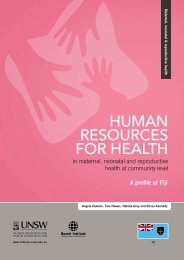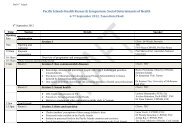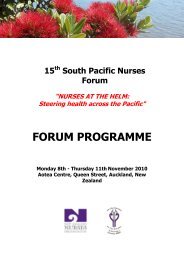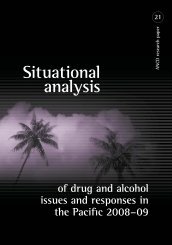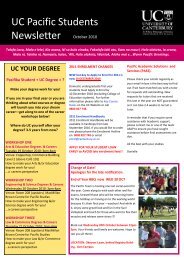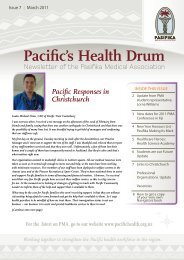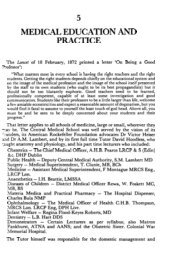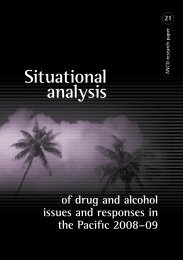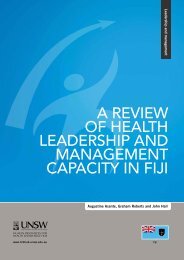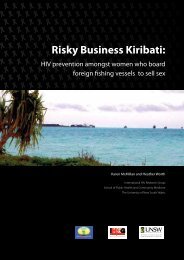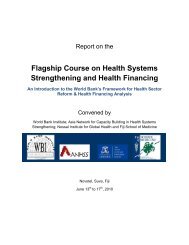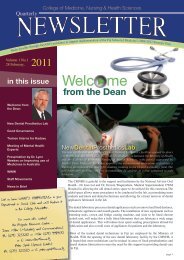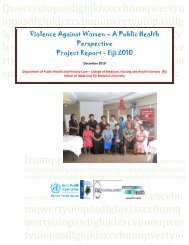Human Resources for Health in Maternal, Neonatal and - HRH ...
Human Resources for Health in Maternal, Neonatal and - HRH ...
Human Resources for Health in Maternal, Neonatal and - HRH ...
Create successful ePaper yourself
Turn your PDF publications into a flip-book with our unique Google optimized e-Paper software.
appendix 5 lists the numbers <strong>and</strong> references by country. This <strong>in</strong>dicates a gap <strong>in</strong> knowledge<br />
regard<strong>in</strong>g tra<strong>in</strong><strong>in</strong>g <strong>in</strong> Pacific Isl<strong>and</strong> countries. There is considerable literature on TBA<br />
tra<strong>in</strong><strong>in</strong>g with a lack of <strong>in</strong><strong>for</strong>mation available on professional midwifery tra<strong>in</strong><strong>in</strong>g with the<br />
exception of Indonesia. The majority of tra<strong>in</strong><strong>in</strong>g courses focus on improv<strong>in</strong>g skilled<br />
attendance at childbirth. There is a lack of <strong>in</strong><strong>for</strong>mation concern<strong>in</strong>g competencies <strong>in</strong><br />
reproductive health.<br />
Family Care International‘s (FCI) Skilled Care Initiative provides a useful example of the<br />
implementation <strong>and</strong> evaluation of tra<strong>in</strong><strong>in</strong>g with<strong>in</strong> a comprehensive programme. This <strong>in</strong>itiative<br />
aimed to test <strong>and</strong> evaluate strategies to <strong>in</strong>crease skilled attendance at childbirth <strong>in</strong> four rural,<br />
underserved districts <strong>in</strong> Burk<strong>in</strong>a Faso, Kenya, <strong>and</strong> Tanzania. The <strong>in</strong>itiative <strong>in</strong>cluded tra<strong>in</strong><strong>in</strong>g<br />
over 300 maternity care providers <strong>in</strong> rout<strong>in</strong>e maternal health services (e.g. antenatal care,<br />
normal delivery care, <strong>and</strong> postpartum care), as well as essential obstetric skills, such as active<br />
management of the third stage of labour, use of the partograph, <strong>in</strong>fection prevention, <strong>and</strong><br />
management of obstetric complications (e.g. reta<strong>in</strong>ed placenta, haemorrhage, abnormal<br />
labour, <strong>in</strong>complete abortion, etc.). Tra<strong>in</strong><strong>in</strong>g was also provided <strong>in</strong> <strong>in</strong>terpersonal<br />
communication <strong>and</strong> counsell<strong>in</strong>g, with an emphasis on compassionate treatment of clients <strong>and</strong><br />
birth preparedness counsell<strong>in</strong>g. To re<strong>in</strong><strong>for</strong>ce the tra<strong>in</strong><strong>in</strong>g <strong>and</strong> to address the lack of st<strong>and</strong>ards<br />
<strong>and</strong> protocols, FCI worked with the M<strong>in</strong>istry of <strong>Health</strong> <strong>in</strong> each country to develop job aids<br />
<strong>and</strong> cl<strong>in</strong>ical reference tools on obstetric care (FCI 2007; FCI 2007). The programme<br />
evaluation employed a pre-test/post-test, quasi experimental design with purposively selected<br />
comparison zones. In addition to survey <strong>in</strong>struments used to gather <strong>in</strong><strong>for</strong>mation from<br />
managers facilities <strong>and</strong> clients, tools were developed to assess community level provider<br />
tra<strong>in</strong><strong>in</strong>g, qualifications, supervision, knowledge, <strong>and</strong> stated practises (FCI 2005).<br />
Although the evaluation found improvements <strong>in</strong> the tra<strong>in</strong><strong>in</strong>g <strong>and</strong> deployment of skilled<br />
attendant cadres the shortages of skilled attendants had negative consequences <strong>for</strong> the<br />
availability <strong>and</strong> quality of maternity care. The f<strong>in</strong>d<strong>in</strong>gs highlight the need <strong>for</strong> quality preservice<br />
tra<strong>in</strong><strong>in</strong>g programmes to ensure that essential competencies of a skilled attendant as<br />
well as the need to address manpower shortages with<strong>in</strong> the health system. The f<strong>in</strong>d<strong>in</strong>gs of the<br />
FCI Skilled Care Initiative concur with other studies that conclude that competency alone<br />
will not necessarily improve maternal health. Skilled attendants must be ―widely available,<br />
they must be allowed to do what they are tra<strong>in</strong>ed to do, <strong>and</strong> they must have logistical <strong>and</strong><br />
policy support ―(Carlough <strong>and</strong> McCall 2005).<br />
Tra<strong>in</strong><strong>in</strong>g appears to be a useful component of human resource strengthen<strong>in</strong>g however it is<br />
difficult to draw conclusions from the multitude of studies <strong>in</strong>to <strong>HRH</strong> tra<strong>in</strong><strong>in</strong>g due to issues<br />
with their quality particularly that of TBA tra<strong>in</strong><strong>in</strong>g (Bergström 2001). Studies that l<strong>in</strong>ked<br />
improvements <strong>in</strong> mortality <strong>and</strong> morbidity are suspect as they require large numbers to show<br />
effect <strong>and</strong> there are many confounders. In addition tra<strong>in</strong><strong>in</strong>g on its own is unlikely to br<strong>in</strong>g<br />
about susta<strong>in</strong>ed change <strong>in</strong> MNRH outcomes. This highlights the importance of tra<strong>in</strong><strong>in</strong>g<br />
P a g e | 135



